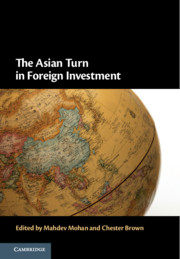26 results
Part V - Emerging Issues
-
- Book:
- The Asian Turn in Foreign Investment
- Published online:
- 13 August 2021
- Print publication:
- 26 August 2021, pp 259-360
-
- Chapter
- Export citation
Abbreviations
-
- Book:
- The Asian Turn in Foreign Investment
- Published online:
- 13 August 2021
- Print publication:
- 26 August 2021, pp xliv-xlviii
-
- Chapter
- Export citation
Index
-
- Book:
- The Asian Turn in Foreign Investment
- Published online:
- 13 August 2021
- Print publication:
- 26 August 2021, pp 399-420
-
- Chapter
- Export citation
Tables
-
- Book:
- The Asian Turn in Foreign Investment
- Published online:
- 13 August 2021
- Print publication:
- 26 August 2021, pp ix-ix
-
- Chapter
- Export citation
2 - Investment Agreements and Dispute Settlement in Singapore
- from Part II - National Approaches within Asia to the Regulation and Protection of Foreign Investment
-
-
- Book:
- The Asian Turn in Foreign Investment
- Published online:
- 13 August 2021
- Print publication:
- 26 August 2021, pp 13-28
-
- Chapter
- Export citation
Contents
-
- Book:
- The Asian Turn in Foreign Investment
- Published online:
- 13 August 2021
- Print publication:
- 26 August 2021, pp v-vii
-
- Chapter
- Export citation
Acknowledgements
-
- Book:
- The Asian Turn in Foreign Investment
- Published online:
- 13 August 2021
- Print publication:
- 26 August 2021, pp xvii-xvii
-
- Chapter
- Export citation
Part I - Introduction
-
- Book:
- The Asian Turn in Foreign Investment
- Published online:
- 13 August 2021
- Print publication:
- 26 August 2021, pp 1-10
-
- Chapter
- Export citation
Part IV - Multilateral Rule-Making in Asia on Trade and Investment: From ASEAN to the Comprehensive and Progressive Agreement for Trans-Pacific Partnership
-
- Book:
- The Asian Turn in Foreign Investment
- Published online:
- 13 August 2021
- Print publication:
- 26 August 2021, pp 181-258
-
- Chapter
- Export citation
Copyright page
-
- Book:
- The Asian Turn in Foreign Investment
- Published online:
- 13 August 2021
- Print publication:
- 26 August 2021, pp iv-iv
-
- Chapter
- Export citation
Table of Treaties
-
- Book:
- The Asian Turn in Foreign Investment
- Published online:
- 13 August 2021
- Print publication:
- 26 August 2021, pp xxvi-xliii
-
- Chapter
- Export citation
1 - Introduction
- from Part I - Introduction
-
-
- Book:
- The Asian Turn in Foreign Investment
- Published online:
- 13 August 2021
- Print publication:
- 26 August 2021, pp 3-10
-
- Chapter
- Export citation
Part III - The Rebalancing of Regulatory Space and Investor Protection in Asia
-
- Book:
- The Asian Turn in Foreign Investment
- Published online:
- 13 August 2021
- Print publication:
- 26 August 2021, pp 101-180
-
- Chapter
- Export citation
Part VI - What Lies Ahead?
-
- Book:
- The Asian Turn in Foreign Investment
- Published online:
- 13 August 2021
- Print publication:
- 26 August 2021, pp 361-398
-
- Chapter
- Export citation
Part II - National Approaches within Asia to the Regulation and Protection of Foreign Investment
-
- Book:
- The Asian Turn in Foreign Investment
- Published online:
- 13 August 2021
- Print publication:
- 26 August 2021, pp 11-100
-
- Chapter
- Export citation
4 - Out with the Old, In with the New?
- from Part II - National Approaches within Asia to the Regulation and Protection of Foreign Investment
-
-
- Book:
- The Asian Turn in Foreign Investment
- Published online:
- 13 August 2021
- Print publication:
- 26 August 2021, pp 48-62
-
- Chapter
- Export citation
Contributors
-
- Book:
- The Asian Turn in Foreign Investment
- Published online:
- 13 August 2021
- Print publication:
- 26 August 2021, pp x-xvi
-
- Chapter
- Export citation
Table of Cases
-
- Book:
- The Asian Turn in Foreign Investment
- Published online:
- 13 August 2021
- Print publication:
- 26 August 2021, pp xviii-xxv
-
- Chapter
- Export citation
Figures
-
- Book:
- The Asian Turn in Foreign Investment
- Published online:
- 13 August 2021
- Print publication:
- 26 August 2021, pp viii-viii
-
- Chapter
- Export citation

The Asian Turn in Foreign Investment
-
- Published online:
- 13 August 2021
- Print publication:
- 26 August 2021



